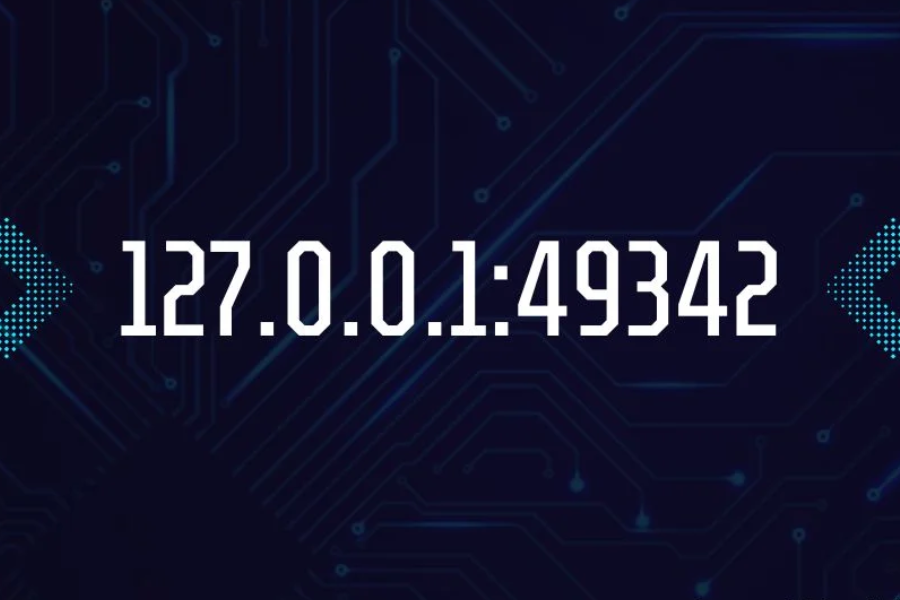In the world of computing, it’s easy to get lost in the ocean of technical terms and concepts that frequently flash across our screens. One such term that often baffles both new users and seasoned tech enthusiasts is “127.0.0.1:49342.” While it may seem like just another string of numbers, it holds significant meaning in the realm of IP addresses and network configurations. This blog aims to demystify “127.0.0.1:49342,” helping you understand its importance and how it functions within your computer system.
From the basics of IP addresses to the specific roles of localhost and port numbers, we’ll cover everything you need to know about “127.0.0.1:49342.” Whether you’re an IT professional, a tech enthusiast, or a student eager to learn, this guide will provide you with valuable insights and practical knowledge of “127.0.0.1:49342”.
Understanding IP Addresses
The Basics of IP Addresses
An IP address like “127.0.0.1:49342” is a unique numerical identifier assigned to each device connected to a network. These addresses make it possible for devices to recognize and communicate with each other. Think of an IP address as a phone number for your computer; just as a phone number ensures your call reaches the intended recipient, an IP address ensures data packets reach their correct destination.
IP addresses come in two main versions—IPv4 and IPv6. IPv4 addresses are 32-bit numbers, typically represented in dot-decimal notation (e.g., 192.168.1.1). IPv6 addresses, on the other hand, are 128-bit numbers, providing a much larger pool of addresses to accommodate the growing number of internet-connected devices.
Types of IP Addresses
IP addresses can be broadly categorized into two types—static and dynamic. Static IP addresses remain constant, offering a reliable way for devices to be located and accessed at any time. These are often used for servers and other critical devices that need a permanent address.
Dynamic IP addresses, in contrast, are assigned by a DHCP server and can change over time. Most home networks and many business environments use dynamic IP addresses due to their flexibility and efficient allocation of network resources.
Static IP Addresses
Static IP addresses are particularly useful for devices that need to be consistently reachable, such as web servers, email servers, and network printers. They offer stability and reliability, ensuring that these devices retain the same IP address even after a reboot or network reconfiguration.
However, static IP addresses require manual configuration and management, which can be time-consuming. Additionally, they are more susceptible to security risks, as a constant IP address can become a target for attackers. Despite these challenges, the benefits of having a static IP often outweigh the drawbacks for critical network components.
Dynamic IP Addresses
Flexibility and Efficiency
Dynamic IP addresses are automatically assigned by a DHCP server, making them highly flexible and efficient for managing large networks. This automatic allocation reduces the administrative burden of manually configuring each device’s IP address. It also ensures efficient use of available IP addresses, as addresses can be reused when devices disconnect from the network.
Reduced Security Risks
One advantage of dynamic IP addresses is their reduced vulnerability to certain types of cyberattacks. Since the IP address can change with each connection, it becomes more challenging for attackers to target a specific device. This added layer of security makes dynamic IP addresses a preferred choice for many users and organizations.
Accessibility Challenges
While dynamic IP addresses offer many benefits, they can present challenges for devices that need to be consistently accessible. For instance, remote access to a computer with a dynamic IP address can be problematic if the IP changes frequently. In such cases, dynamic DNS services can help maintain a consistent address by mapping a domain name to the changing IP.
Deciphering 127.0.0.1:49342
The Significance of 127.0.0.1
The IP address “127.0.0.1” holds a special place in the world of computing. Commonly referred to as “localhost,” it represents the device you’re currently using. This internal address allows applications to communicate with each other on the same device without needing an external network connection. It’s a crucial tool for developers, enabling them to test and debug applications locally.
Understanding Port 49342
Ports serve as communication endpoints for different services running on a device. When combined with an IP address, they direct traffic to the appropriate application. In the case of “127.0.0.1:49342,” “127.0.0.1” directs the traffic to the local device, while port “49342” specifies the particular service or application.
The Role of Localhost
Localhost, represented by “127.0.0.1,” is essential for testing and troubleshooting software and network configurations. It allows developers to run applications locally, ensuring they function correctly before deployment. By using “127.0.0.1,” developers can isolate issues and identify bugs without affecting other devices on the network.
Differentiating Public and Private IP Addresses
Public IP Addresses
Public IP addresses are accessible over the internet, allowing devices to communicate with external networks. These addresses are assigned by Internet Service Providers (ISPs) and are unique to each device. Public IP addresses are essential for accessing websites, sending emails, and performing other internet-based activities.
Private IP Addresses
Private IP addresses, on the other hand, are restricted to local networks and cannot be accessed from the internet. These addresses are used for communication within a private network, such as a home or office. Private IP addresses are often used for devices like routers, printers, and computers, enabling seamless communication without external interference.
The Importance of Differentiation
Understanding the difference between public and private IP addresses is crucial for network security and management. Public IP addresses expose devices to potential cyber threats, making it essential to implement robust security measures. Private IP addresses, while more secure, require proper configuration to ensure efficient network communication.
Exploring the Role of Port 49342
Facilitating Communication
Port 49342 plays a vital role in enabling communication between various services and applications on a single device. By specifying a particular service, the port ensures that data reaches the correct destination, even when multiple applications are running simultaneously.
Conflict Resolution
When multiple services or applications operate on the same device, conflicts can arise. Port 49342 helps resolve these conflicts by directing traffic to the appropriate service. This ensures smooth operation and prevents data from being misrouted or lost.
Configuring Virtual Machines and APIs
Ports like 49342 are essential for configuring virtual machines and Application Programming Interfaces (APIs). They enable efficient networking and communication functionalities, allowing virtual machines to interact seamlessly with other devices and services. Proper configuration of ports is crucial for maintaining network performance and reliability.
Execution of Localhost Functions
Installing Server Software
To leverage the capabilities of localhost, you need to install server software such as Nginx, Apache, or IIS on your host computer. These servers facilitate local testing and development, enabling you to run web applications and services efficiently.
Configuring Server Software
Once the server software is installed, you must configure it to operate on port 49342. This involves editing configuration files to specify the port and ensure incoming connections are directed correctly. Proper configuration is essential for maintaining server performance and security.
Verifying Server Configuration
After configuring the server software, it’s crucial to verify the setup by accessing the website at “127.0.0.1:49342.” This step ensures that the server is running correctly and can handle incoming connections. Regular verification helps identify and resolve issues promptly, maintaining optimal server performance.
Security Implications of 127.0.0.1:49342
Implementing Robust Security Measures
To safeguard services running on “127.0.0.1:49342,” it’s essential to implement robust security measures. This includes configuring firewalls to block unauthorized access and utilizing Virtual Private Networks (VPNs) to secure communication between local machines and servers.
Regular Updates and Patching
Keeping your operating system and server software up to date is crucial for addressing potential vulnerabilities. Regular updates and patching help protect against cyber threats and ensure the security of your services. Staying vigilant and proactive in maintaining security is essential for safeguarding your network.
Monitoring and Auditing
Continuous monitoring and auditing of services running on “127.0.0.1:49342” help identify and mitigate security risks. By regularly reviewing logs and analyzing network traffic, you can detect unusual activity and take appropriate action to prevent breaches. Monitoring and auditing are essential components of a comprehensive security strategy.
Future of Localhost and Ports
The concept of “localhost” and specific ports will continue to evolve as technology advances. Here’s what the future might hold:
Enhanced Security
As cyber threats become more sophisticated, security measures for “localhost” environments will improve. Expect more robust encryption and authentication protocols.
Improved Performance
Advancements in networking technologies will lead to faster and more efficient communication within localhost environments. This improvement will benefit developers and IT professionals alike.
Expanded Applications
The versatility of “localhost” will drive its adoption in new fields. From IoT to AI, expect “127.0.0.1” to play a crucial role in various technological advancements.
Concluding Remarks
The Importance of Understanding 127.0.0.1:49342
Understanding the significance of “127.0.0.1:49342” is essential for efficient localhost operations. By grasping the basics of IP addresses, ports, and network configurations, you can troubleshoot issues effectively and utilize localhost functionalities with confidence.
Empowering Tech Enthusiasts and Professionals
This comprehensive guide aims to empower tech enthusiasts, IT professionals, and students with the knowledge they need to navigate the complexities of IP addresses and ports. By understanding “127.0.0.1:49342,” you can enhance your technical skills and contribute to more efficient and secure network operations.
Taking Action and Further Resources
Now that you have a deeper understanding of “127.0.0.1:49342,” take the next step by exploring additional resources and tools. Whether you’re configuring a local server, troubleshooting network issues, or enhancing your cybersecurity measures, the knowledge you’ve gained will serve as a valuable foundation for “127.0.0.1:49342”. Continue learning and stay ahead in the ever-evolving world of computing.
—












